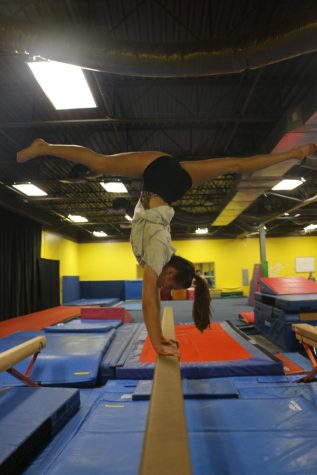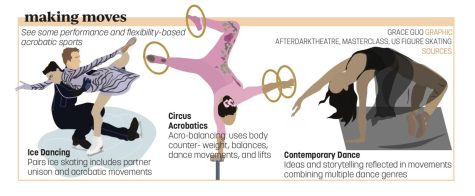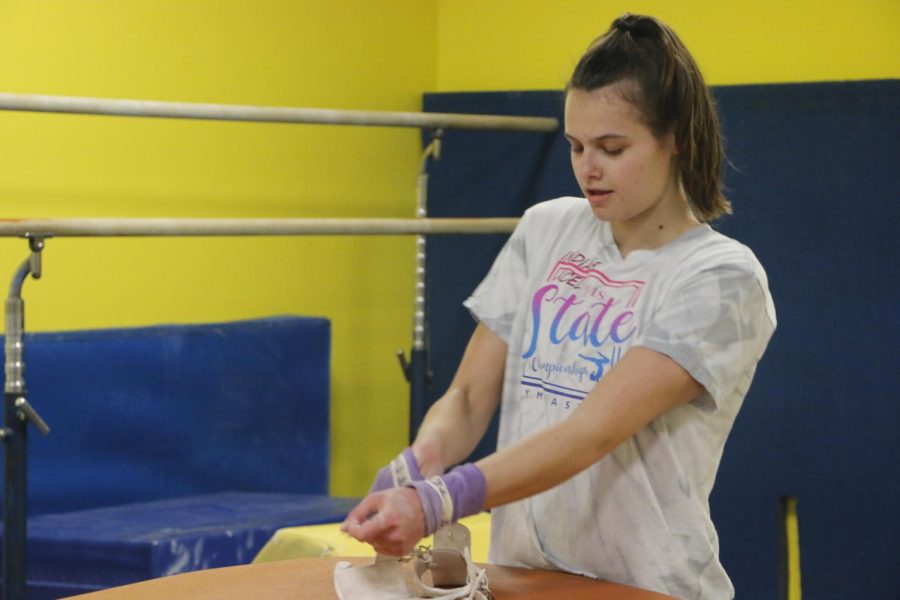According to gymnast and junior Kendall Powell, many people watch gymnastics for the entertainment aspect but fail to realize the type of athleticism needed for the activity.
“Even if I didn’t do gymnastics, I would know how hard they work and seeing it on the Olympics and just on TV, you can see how much strength (gymnasts) need. It’s just amazing watching it as well, like what they’re capable of and making it look so easy,” Powell said.
Powell has been a part of both the competitive and the non-competitive side of gymnastics. She recently quit competing and now only does gymnastics for fun, but she said she still considers the entertaining activity a true sport.
Like gymnastics, figure skating also has an entertainment aspect that makes its definition as a sport more complex. Marie Millikan, née Víchová, is a figure skating coach and analyst for the Associated Press, and has covered eight Winter Olympics for the agency. She is also a former Olympian who represented Czechoslovakia in the 1968 Winter Olympics. She said she has no doubt that the entertaining activity is a sport but it does have its unique challenges and differences compared to more mainstream activities.
“Let’s say you are a weightlifter or football player, you need to have the strength so you can lift the weights and do whatever you need, so you can bulk up and get lots of muscles,” Millikan said. “Unfortunately, figure skaters cannot do that because if you bulk up and get big shoulders, you will be tipping in the air or you would look fat in their dress. You have to be as strong as a bull and as skinny as spaghetti to be able to rotate that fast in the air. You have to be very, very slim, but you have to have super strength.”

Ballet and acrobatics also straddle the line between sports and entertainment. For her part, ballet dancer and junior Lucy Devenney said she only sees what she does as entertainment.
“I’d say I wouldn’t necessarily call (ballet) a sport, especially the kind of dance that I do since I don’t compete. It’s purely entertainment with the sort of stuff we’re doing, like Nutcracker and Cinderella and fairy tale stuff basically,” Devenney said.
Competition aspects of activities commonly play a role into whether or not people watch it as entertainment or sports. For example, The Peking Acrobats are a non-competitive group from China that perform daring tumbling acts and more as they travel with the sole purpose to entertain people. They will perform tomorrow at the Palladium.
Powell said activities like acrobatics and gymnastics are not only entertaining for the crowd, but also for the athlete.
“It can be more entertaining because of the freedom of making your own routines and being able to add in your own flare to make it your own, also making it a lot more entertaining to watch,” she said.
Millikan said it’s this requirement to engage crowds that makes figure skating so special.
“Even if you have musicality and choreography and all that, it still doesn’t mean you are entertaining people,” she said. “You’ve got to be able to connect with the audience and so forth.”
Another difference is that although having an engaged crowd is important with performance sports, the loud screaming and cheering that is common at more mainstream sporting events can throw off the performer’s level of success in activities like gymnastics. Powell said a gymnast’s need to perform to the best of their ability during competitions, whether it be skill wise or entertainment wise, is extremely important due to the fact that there are judges watching their every move, unlike sports including football and basketball where there are no judges, just set points.
“Mentally it can be scary because when you’re competing in gymnastics, you have judges that are right in front of you, whereas in football, you don’t have judges, there are just people, Powell said. “Whereas in gymnastics, you have both people and judges watching you. So I guess it could be a little more nerve-wracking that way.”
Devenney said she agrees with Powell about the nervousness caused by performing but also said she loves the audience’s support when it comes to the non-competitive activity she participates in. 
“I get nervous, but it’s also a lot more exciting because you know that the audience is on your side. I guess they want you to do well, whereas in a competitive environment sometimes that’s not the case,” she said.
As a coach, Millikan said she knows firsthand how nerve-wracking these performance sports are compared to the more mainstream sports.
She said, “Do not criticize people if you haven’t tried it. You hear a lot of times people say, ‘Oh, that’s so easy, what’s the big deal?’ Put the skates on or go on that balance beam, whatever it may be and try it and figure it out if it’s as easy as you think it is.”

































![AI in films like "The Brutalist" is convenient, but shouldn’t take priority [opinion]](https://hilite.org/wp-content/uploads/2025/02/catherine-cover-1200x471.jpg)










































![Review: “The Immortal Soul Salvage Yard:” A criminally underrated poetry collection [MUSE]](https://hilite.org/wp-content/uploads/2025/03/71cju6TvqmL._AC_UF10001000_QL80_.jpg)
![Review: "Dog Man" is Unapologetically Chaotic [MUSE]](https://hilite.org/wp-content/uploads/2025/03/dogman-1200x700.jpg)
![Review: "Ne Zha 2": The WeChat family reunion I didn’t know I needed [MUSE]](https://hilite.org/wp-content/uploads/2025/03/unnamed-4.png)
![Review in Print: Maripaz Villar brings a delightfully unique style to the world of WEBTOON [MUSE]](https://hilite.org/wp-content/uploads/2023/12/maripazcover-1200x960.jpg)
![Review: “The Sword of Kaigen” is a masterpiece [MUSE]](https://hilite.org/wp-content/uploads/2023/11/Screenshot-2023-11-26-201051.png)
![Review: Gateron Oil Kings, great linear switches, okay price [MUSE]](https://hilite.org/wp-content/uploads/2023/11/Screenshot-2023-11-26-200553.png)
![Review: “A Haunting in Venice” is a significant improvement from other Agatha Christie adaptations [MUSE]](https://hilite.org/wp-content/uploads/2023/11/e7ee2938a6d422669771bce6d8088521.jpg)
![Review: A Thanksgiving story from elementary school, still just as interesting [MUSE]](https://hilite.org/wp-content/uploads/2023/11/Screenshot-2023-11-26-195514-987x1200.png)
![Review: "When I Fly Towards You", cute, uplifting youth drama [MUSE]](https://hilite.org/wp-content/uploads/2023/09/When-I-Fly-Towards-You-Chinese-drama.png)
![Postcards from Muse: Hawaii Travel Diary [MUSE]](https://hilite.org/wp-content/uploads/2023/09/My-project-1-1200x1200.jpg)
![Review: "Ladybug & Cat Noir: The Movie," departure from original show [MUSE]](https://hilite.org/wp-content/uploads/2023/09/Ladybug__Cat_Noir_-_The_Movie_poster.jpg)
![Review in Print: "Hidden Love" is the cute, uplifting drama everyone needs [MUSE]](https://hilite.org/wp-content/uploads/2023/09/hiddenlovecover-e1693597208225-1030x1200.png)
![Review in Print: "Heartstopper" is the heartwarming queer romance we all need [MUSE]](https://hilite.org/wp-content/uploads/2023/08/museheartstoppercover-1200x654.png)




